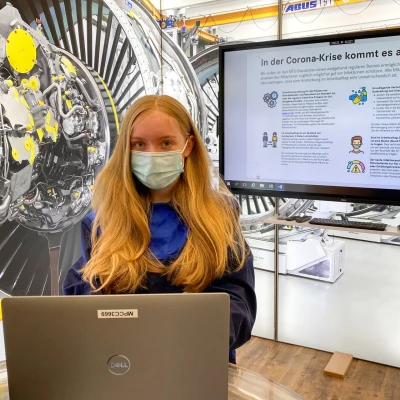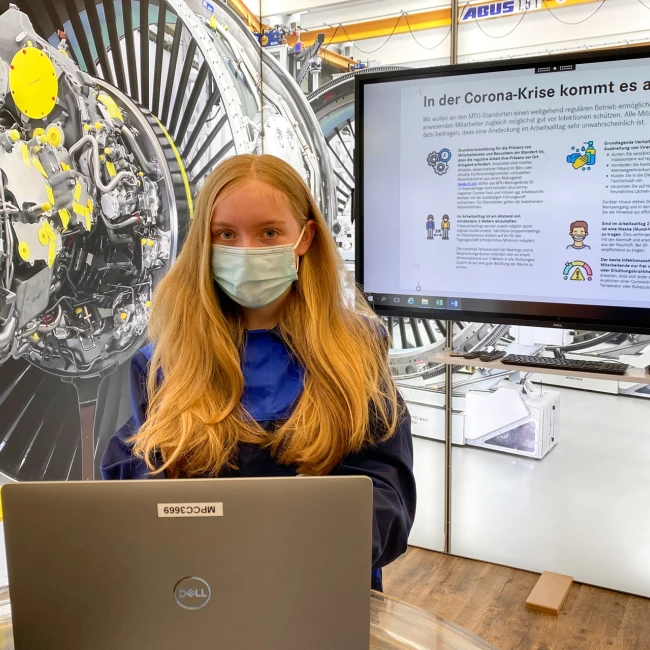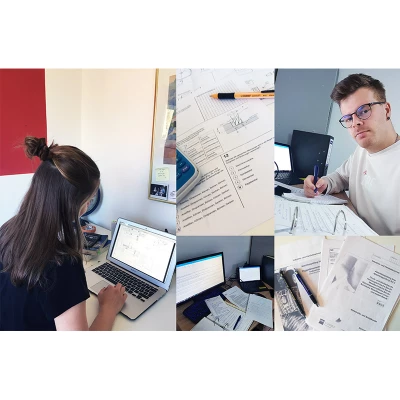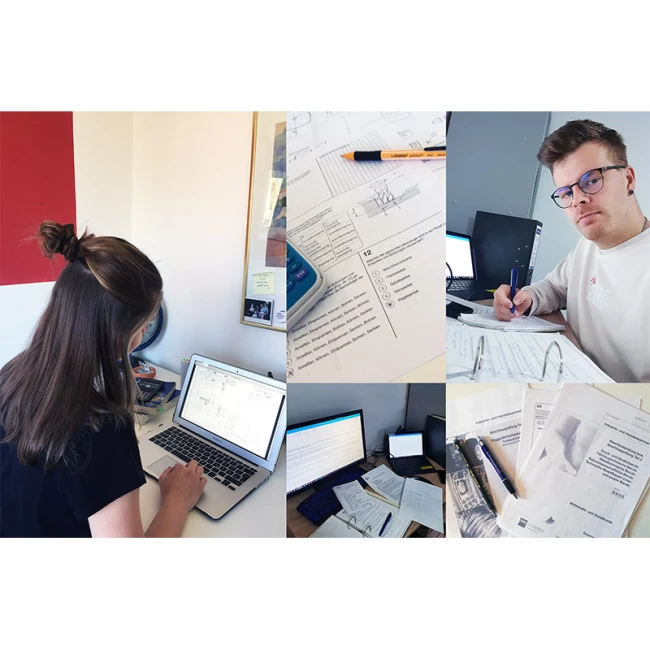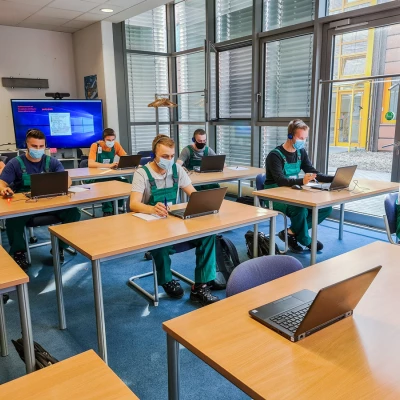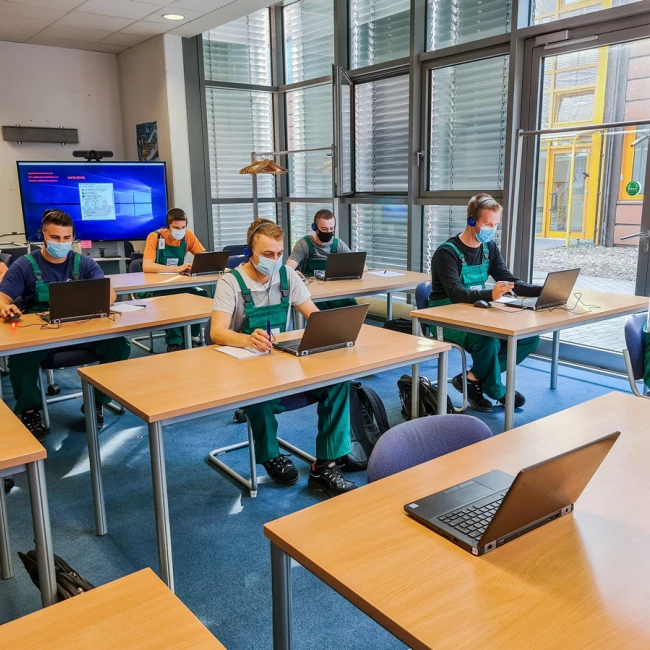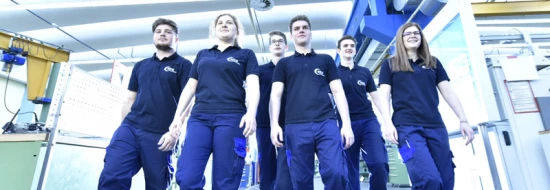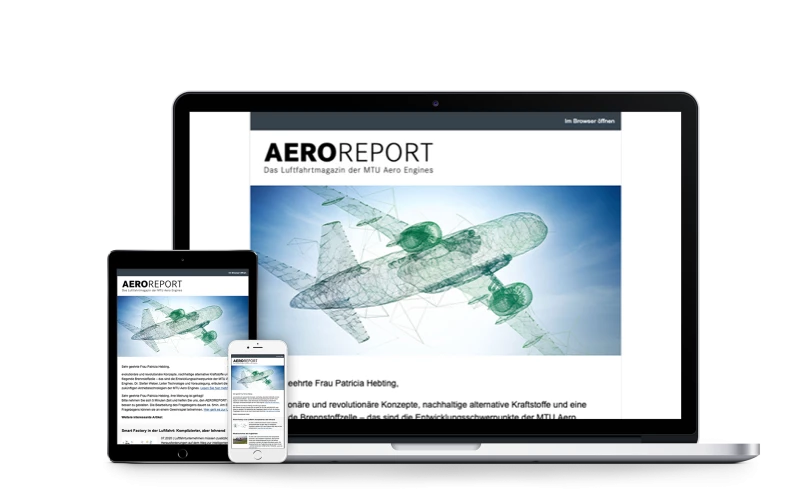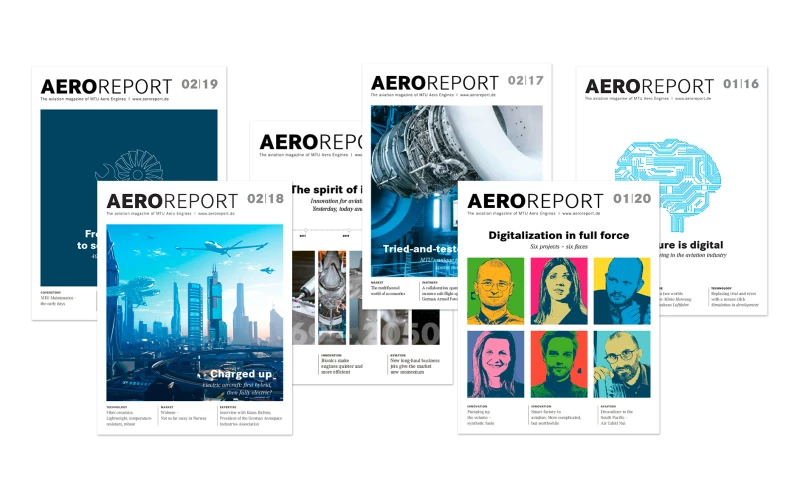people
MTU promotes digitalization in training
New teaching methods, virtual events and tablets for apprentices: MTU shows what successful training looks like in pandemic times. But hands-on practice in the shop remains paramount.
05.2021 | author: Nicole Geffert | 7 mins reading time
author:
Nicole Geffert
has been working as a freelance journalist covering topics such as research and science, money and taxes, and education and careers since 1999.
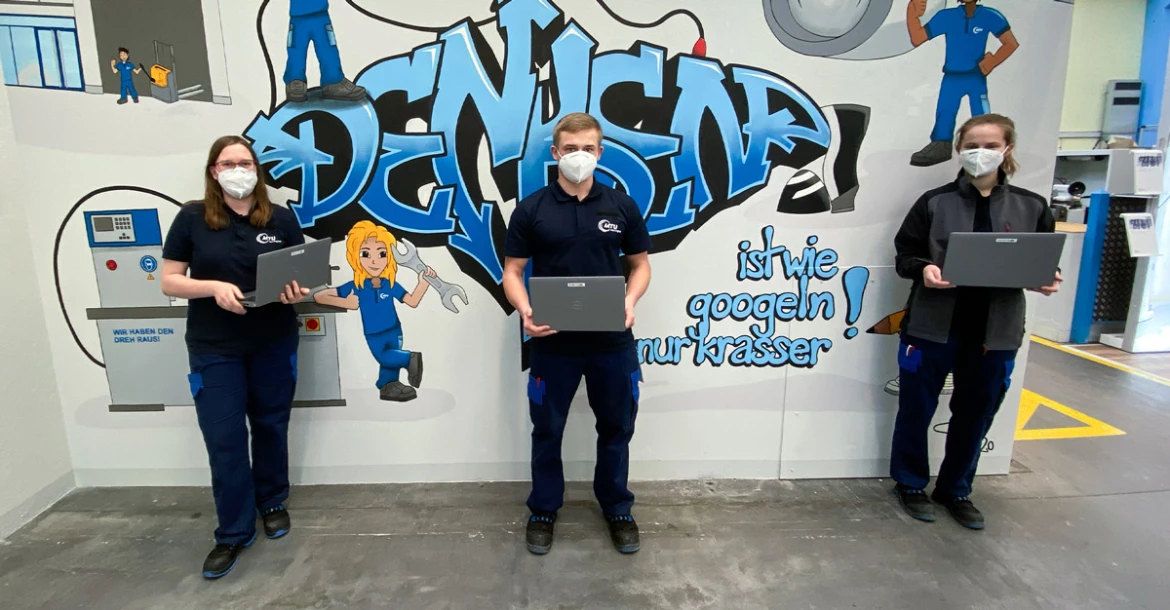
“We followed through with our training program as planned,” says Dustin Emmermacher, senior trainer at MTU Maintenance Berlin-Brandenburg, looking back on a challenging but successful training year amid the coronavirus pandemic. “In the practical training on-site, there were no cuts.” At the MTU site in Ludwigsfelde, a total of 29 young people are currently doing an apprenticeship. Emmermacher: “There are never more than 16 of our apprentices on-site, because for the two apprenticeship options we offer—aircraft maintenance engineer and industrial mechanic—the theory and practice phases alternate in any case.”
However, the pandemic did make hands-on recruiting more difficult: campaigns in schools, vocational training fairs, internships, open days and many similar initiatives could not take place. “Normally, we visit schools to publicize apprenticeships at MTU,” says Emmermacher. “So we thought up a new approach and filmed a video in which two of our apprentices present their jobs. The video will be sent to schools, so that we reach students even in times of learning from home.”
Digital report books and mobile working
Creative solutions were called for right from the start of the pandemic: In Germany’s first lockdown in spring 2020, the Ludwigsfelde site shut its gates for three weeks. Emmermacher and his colleagues thought up engine-related tasks that the apprentices could solve from home. For example, the second-year apprentices designed a Stirling engine. When the on-site facilities reopened, they built the engine in small teams. And so an emergency solution became a successful experience.
The MTU apprentices are able to work independently off-site because they have the right equipment. They have a “portable workplace,” as Emmermacher puts it: “We’re driving digitalization forward. We’ve supplied our apprentices with laptops since 2019. Instead of using paper, they keep a digital report book and are able to take part in virtual meetings.”
Practical work takes priority
Behind Manfred Hörmann, Head of Training at MTU Aero Engines in Munich, and his team, lies a year in which there was a lot to reimagine and reorganize. Each year, 50 apprentices begin commercial/technical training across five different professions at MTU’s site in Munich, while 15 trainees begin a dual work-study program. This means that MTU has almost 200 trainees on its books in Munich at any one time.
Hörmann: “We had to split up the groups. In our alternating system, half the apprentices learn in the training shop, while the other half learn from home on the laptops they get from the company.” The remote-learning environment was not only an adjustment for the apprentices, but also for MTU’s trainers, who had to master digital teaching methods and create teaching material at short notice.
Digital formats as a substitute
“It’s a huge effort, but it works because everyone is giving their all,” says Hörmann. For example, the training team at MTU’s site in Munich have helped develop numerous new digital formats, which substitute for at least some of the planned events. The welcoming of apprentices on their first day of work took place in part virtually, and in part through events in small groups. Meanwhile, the Tag der Ausbildung, a special day dedicated to training at the company, was livestreamed with chat and a virtual tour. The MTU trainers have also been participating in digital trade shows and career information days at schools in order to present the exciting jobs in the field of aircraft engines to students.
“However, the new digital formats are not there to replace practical training in our high-tech industry, in which hands-on practice is fundamentally important and is what really sparks enthusiasm for the job,” Hörmann is keen to stress. That said, some of the new digital solutions are here to stay—mandatory training, for example, which will continue to take place online in the future, such as courses on occupational safety, no-blame culture, lean management, SAP and Outlook. Hörmann: “Even though the pandemic has made things more difficult, we’re doing our utmost to provide our recruits with first-class training.”
Virtual engine courses
Roland Meyer, Head of Training at MTU Maintenance Hannover, and his team pulled out all the stops to give the apprentices the best-possible year under the circumstances. At the MTU site in Hannover, a total of 81 young people are currently doing an apprenticeship.
“During the first lockdown, when vocational schools closed and we had to shut up shop temporarily, we spontaneously introduced remote learning with adapted content,” says Meyer. To reduce group sizes, engine and theoretical courses went partly virtual. So that apprentices could fully prepare for written examinations, Meyer and his colleagues created a decentralized learning concept that is supported by the use of digital media.
IT boot camp for digital learning
“We ordered tablets for our apprentices to strengthen and develop their digital skills.” In addition, they receive training on how to work effectively with the tablets and what IT security guidelines they have to observe. “IT boot camp for digital learning” is the name of this initiative.
Practical training is also the top priority in Hannover—under observance of the hygiene regulations in place, as is the case at the other MTU locations. “We’ve added training rooms to our apprentice shop and made the groups smaller, so that practical work remains possible,” explains Meyer. Training people in a greater number of small groups inevitably means creating more dates on the calendar. This called for flexibility and organization skills. The trainers put a lot of energy and extra work into making it happen.
Project work in small groups
“The apprentices didn’t notice this work behind the scenes at all, because everything went so smoothly,” says Meyer. Even if many events, such as international internships and exchange programs, had to be canceled, the apprentices’ project work was still able to go ahead. Meyer: “The project management seminar with an external trainer to kick things off was online this year. It all went smoothly and was a top-quality event.” The subsequent project work in small groups was also a success. Among other things, the apprentices developed a virtual 360-degree tour of the shop.
At all three German MTU locations, people agree that although the pandemic has brought some changes, one thing remains the same: MTU nurtures its young talent and invests in top-class training.
Felix Quitschau is in the second year of his apprenticeship to become an aircraft maintenance engineer at MTU Maintenance Berlin-Brandenburg:
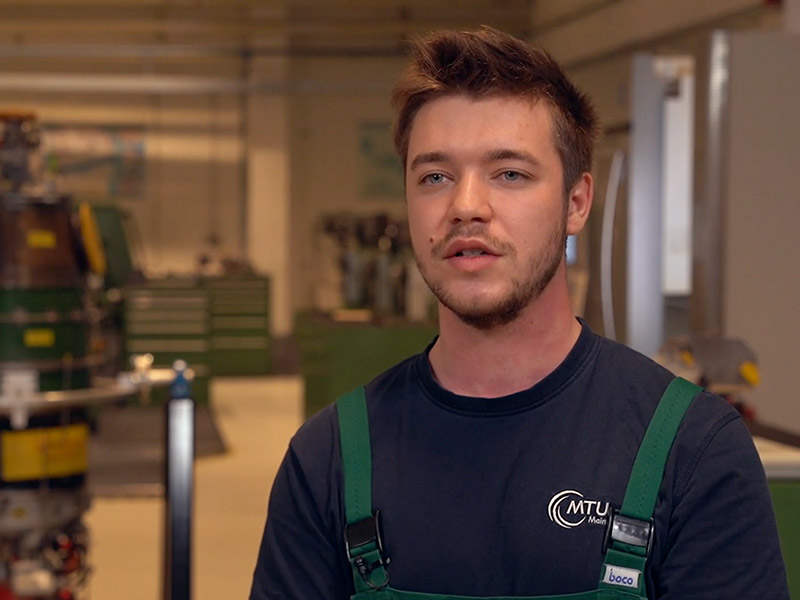
“I never had the feeling that my training was in any way lacking.”
“Our practical training went very well despite the pandemic. Our training shop is big, so distancing during work wasn’t a problem. I never had the feeling that my training was in any way lacking. The vocational lessons, by contrast, weren’t able to go ahead as normal. But our trainers responded immediately. So that we did not miss any of the curriculum, they went through the theoretical subject matter with us in the company. Whenever we had questions or didn’t know what to do next, our trainers took the time to teach the theory to us alongside the practical work. That way, we were perfectly prepared for the interim and final examinations. That all us apprentices got a company laptop is another advantage. They enable us to work independently off-site whenever necessary, and to log into the MTU network, exchange emails and take part in virtual meetings and discussions.”
Leonie Sterz is in the third year of her apprenticeship to become an industrial mechanic at MTU Aero Engines:
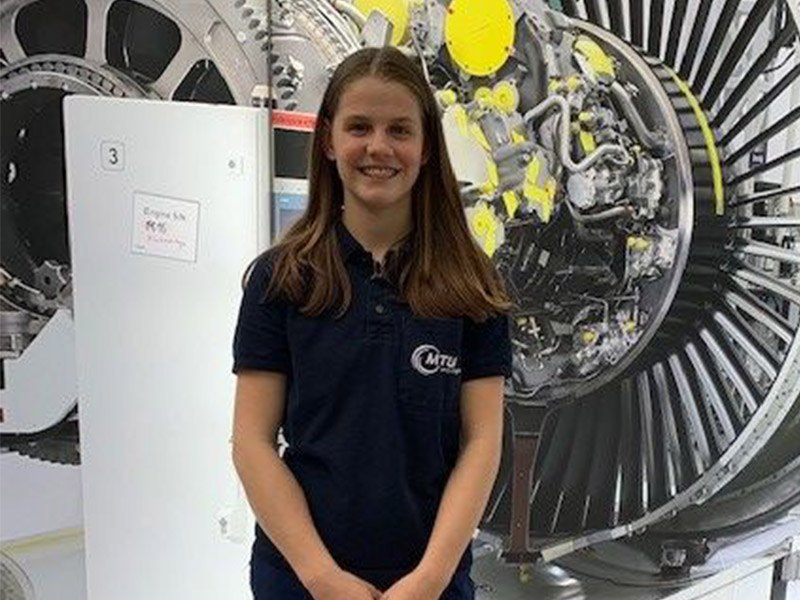
“Department meetings are all virtual. As I have a company laptop, I can work from home and take part in them from there.”
“I’m currently learning my trade in the tool grinding shop at MTU in Munich. We’ve got a clear hygiene concept that allows us to work effectively on-site—even if it was challenging and strange at first to do physical work with a mask on. The practical training is working really well. My trainers and colleagues in the tool grinding shop support me whenever I’ve got questions. Department meetings are all virtual. As I have a company laptop, I can work from home and take part in them from there. When you’re new in a department like I am, you sadly don’t get to know part of the team in person. It’s a pity, but we’ll make up for it as soon as the situation allows it again. I’m still optimistic about it, as I’ll be kept on in the tool grinding shop when I finish my apprenticeship. I was really hoping that would be the case, and gave an emphatic ‘yes’ when my boss asked me if I wanted to stay on.”
Lidia Laudani is in the third year of her apprenticeship to become a warehouse logistics specialist at MTU Maintenance Hannover:
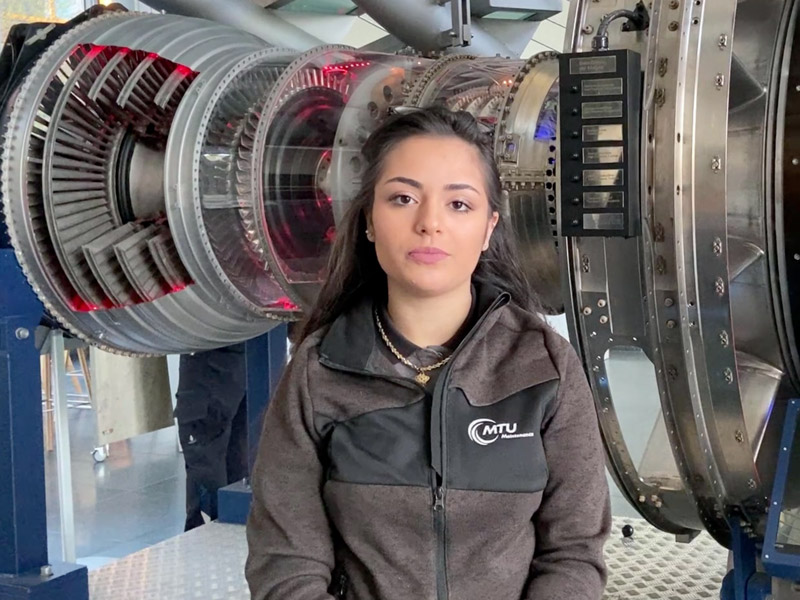
“I’m getting a lot of support to prepare me for my final examinations despite the difficult environment with remote learning.”
“In my training, I do a stint in seven different departments. Because of the coronavirus, the schedule had to be changed somewhat. So in Purchasing, I was on-site only for a few weeks, and the rest of the time I worked from home, which included taking part in virtual team meetings. These were mostly held in English. Now I really want to expand my English skills. I’ve already inquired in the company about the options for taking part in a language course. I need to say a big thank you to the training team—and to my team leader. I’m getting a lot of support to prepare me for my final examinations despite the difficult environment with remote learning. And even in these extraordinary circumstances, I was still able to get my forklift driver’s license at the company. What’s more, when I had the idea to create a detailed schedule for the interns taking part in internship week, my team leader gave me the green light. So, in spite of the coronavirus, everything’s going really great in my apprenticeship!”







